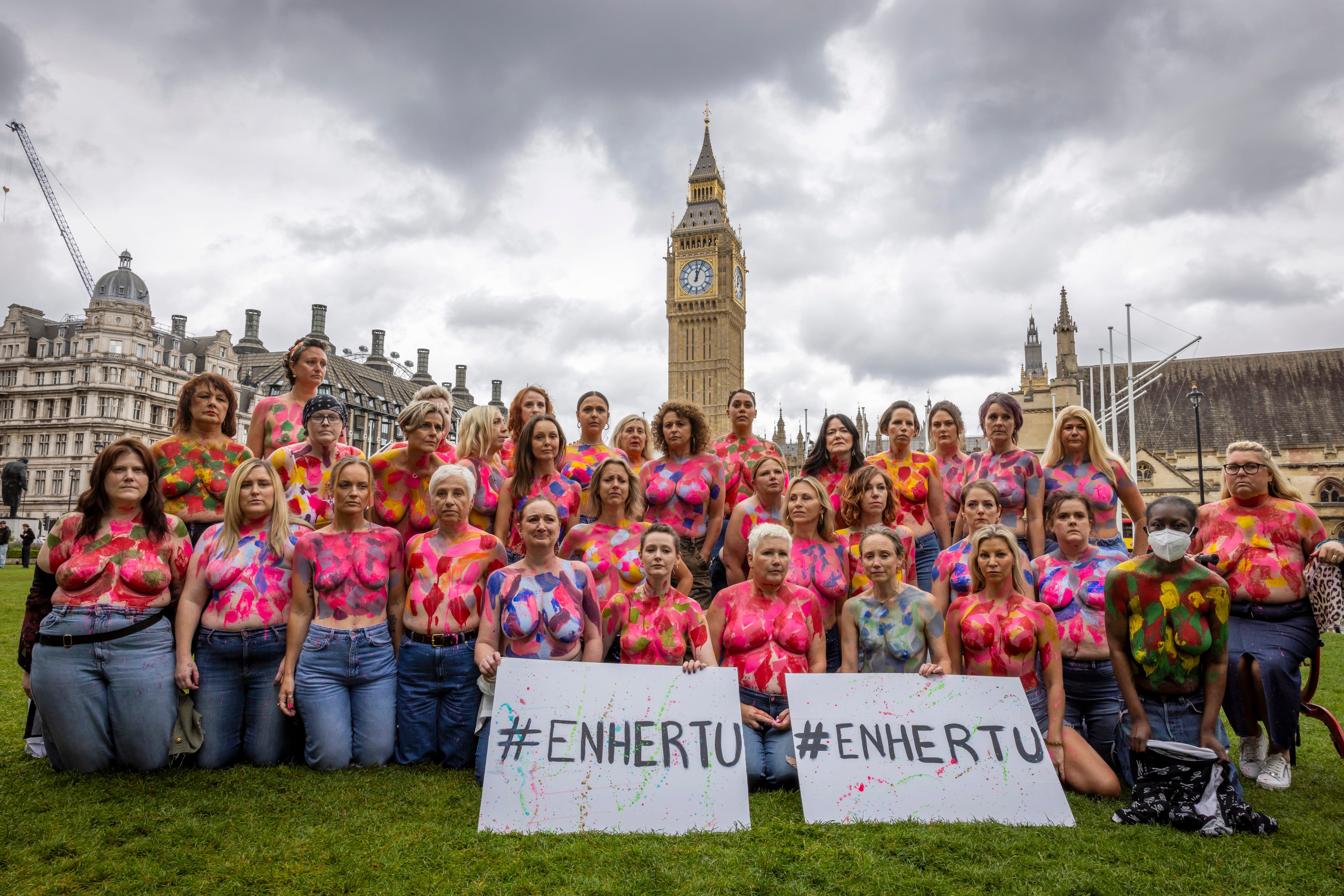‘I’ve spent nearly £30,000 of my own money on a miracle cancer treatment – so why won’t the NHS fund it?’
When the first results of Enhertu were announced at a medical conference two years ago, attendees were so impressed with what it could do that they stood up and cheered. It is now available across the world, so why are patients in England, like Christina Black, still being denied it? Leah Hardy reports


In April, Christina Black heard the words every cancer patient dreads: “We’ve run out of treatments. There is nothing else we can give you.” A doctor had just explained that Christina’s latest scan had revealed that tumours which had spread from her breast to her liver, lungs and spine had grown. This meant her treatment was no longer working, and there were no more options left.
Christina, 63, says, “It was devastating. I was clinging to my husband Paul and crying. I remember saying, ‘What do I do now?’ I had to discuss my end-of-life wishes and was put in touch with the palliative care team at the hospital.”
Yet months on Christine is not just alive and well, but her previously unstoppable tumours are shrinking. Why? Because she is taking a remarkable life-extending breast cancer drug called Enhertu. The downside? The NHS refuses to fund it. That means Christina and Paul, 64, from Liverpool, are being forced to spend their pensions and life savings to pay for the £87,000-a-year drug.
“It’s a horrible situation,” says Christina, her voice cracking with emotion. “Enhertu is the difference between life and death for me. But we don’t know how long we can continue to pay for the treatment.”
Christina was first diagnosed with breast cancer in 1997 at the age of 36. “It was an emotional time,” she recalls. “I was a single mum at the time, and I had to stay strong for my son, Marc, who was 14.”
In spite of surgery and radiotherapy, Christina’s cancer recurred in 2005, with tumours now growing in her collarbone and neck. Over the next two decades, despite 87 rounds of chemotherapy, more than half a dozen different drugs and a mastectomy in 2016, the disease spread throughout her body. As well as the internal tumours that left her out of breath and exhausted, there were cancer cells in her skin at the site of Christina’s mastectomy.
These caused “horrendous and painful” sores on her chest that bled, wept and would not heal. Christina says: “My breast cancer was too advanced to be cured, but I’d always been confident my doctors could put me on another treatment to control it. But now I’d been effectively handed a death sentence.”
Christina was treated at The Clatterbridge Cancer Centre in Liverpool under Professor Carlo Palmieri. “First, I was referred to another hospital that couldn’t help. But then, on 14 June, Dr Palmieri told me about a new treatment called Enhertu. He said, ‘If I were you, I’d want to be on it. It’s amazing, and we are seeing great results.’”

Christina was overjoyed. “I asked why he hadn’t told us before. And he said, ‘The problem is, Enhertu is not available on the NHS.’”
When Christine and Paul said they would pay for treatment, Palmieri immediately introduced Christina to Dr Ahmed, who runs the private clinic at the Clatterbridge, and who was working in the very next room. Ahmed agreed Christina was a good candidate for Enhertu and she started treatment just five days later.
Christina has now had four rounds of Enhertu, which is given via drip. She says: “Each Enhertu treatment costs £7,239 and I will need to have it every three weeks for the rest of my life.”
To fund the treatment, the couple, who have been married 19 years, have had to cash in their life and retirement savings. “We are just ordinary people who worked hard,” she says. “I used to work with disabled people. Paul runs his own construction company. He’s 64 and longs to retire but now can’t. I feel so guilty. But he tells me, ‘We are in this together. I would give them my last penny if it meant keeping you alive.’”

The results of her treatments are astonishing. The tumours in Christina’s liver and lungs have shrunk, and she no longer feels out of breath. Even the sores on her chest have faded away. On a recent holiday to Cornwall, she and Paul walked every day without difficulty. Christina says: “It’s amazing. I am so happy and have hope for the future again.”
Enhertu has the potential to be life-changing for thousands of patients who, like Christina, have a recently identified type of breast cancer called HER2-low, which has spread to other parts of the body. While Enhertu is not a cure, median survival on the treatment was two years, and almost 90 per cent of HER2-low metastatic patients saw their tumours shrink, stop growing or slow down. Four per cent of patients even saw their tumours disappear to the point where there was no cancer visible on scans.

When the first results of Enhertu trials were announced at a medical conference in 2022, the attendees, who had seen many false dawns in cancer treatments, stood up and cheered. Enhertu is now available via public healthcare systems in 18 European countries, Australia, Japan, Canada, the USA, Bahrain, Kuwait, the United Arab Emirates and Scotland. So won’t the NHS fund it?
Astonishingly, the National Institute for Clinical Excellence (NICE), which rates treatments for value for money, classifies Christina’s terminal cancer as a “moderately severe” condition rather than a “severe” one. As a result, the budget for treatment is lower and Enhertu is classed as too expensive. This is even though Daiichi Sankyo and AstraZeneca, the pharma companies that make it, have offered the NHS a discount on the full price, meaning it will likely cost the NHS significantly less than the amount Christina and Paul are paying.
Claire Rowney, chief executive of the charity Breast Cancer Now, which is campaigning for wider access to Enhertu, says the charity believes that the introduction of new “severity modifiers” in 2022 was “pivotal to the recent devastating rejection of Enhertu”.
Christina and Paul are now considering moving from their home in Liverpool to Scotland to access the drug. She says: “I would lose my whole support network, but it might be something we have to do.”

Christina’s hope is that the NICE severity modifier can be changed, and NHS budgets stretched to offer Enhertu not just to her but to the estimated 1,000 other women living with terminal breast cancer who could benefit. A group of breast cancer campaigners are currently fundraising to challenge NICE in court.
“I feel fortunate that we have some money that we can lean on,” says Christina. “But not everyone can afford to pay for treatment, and no one should be put into this situation.
“I am a wife, mother and grandmother. Patients like me need to be seen as people, not just statistics and [they should] make Enhertu available on the NHS, like it is in so many other countries.”
To donate to the legal challenge, visit here and to find out more about breast cancer or for support, visit https://breastcancernow.org





Join our commenting forum
Join thought-provoking conversations, follow other Independent readers and see their replies
Comments